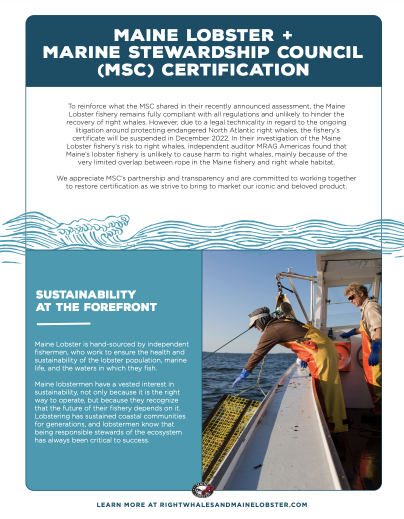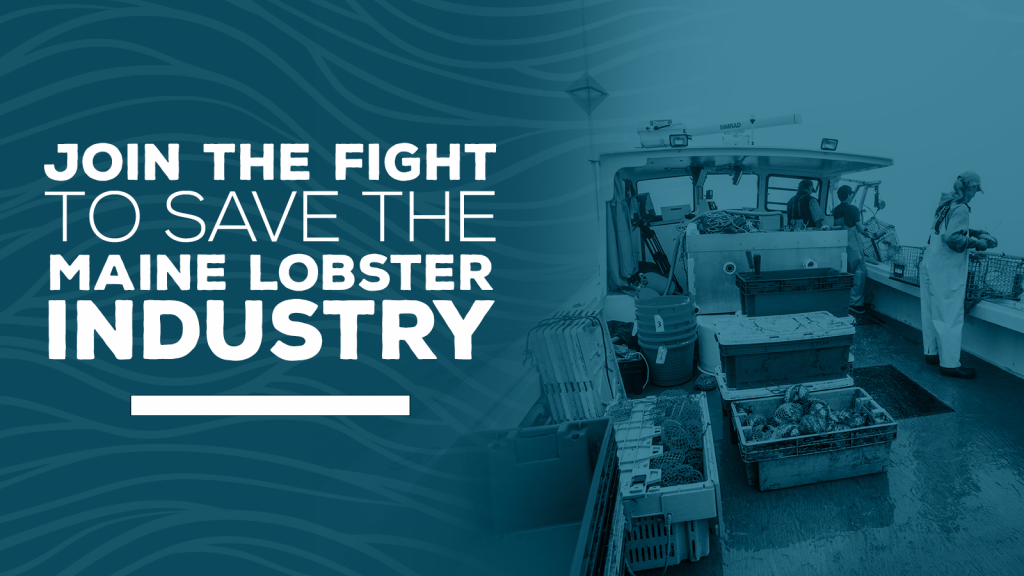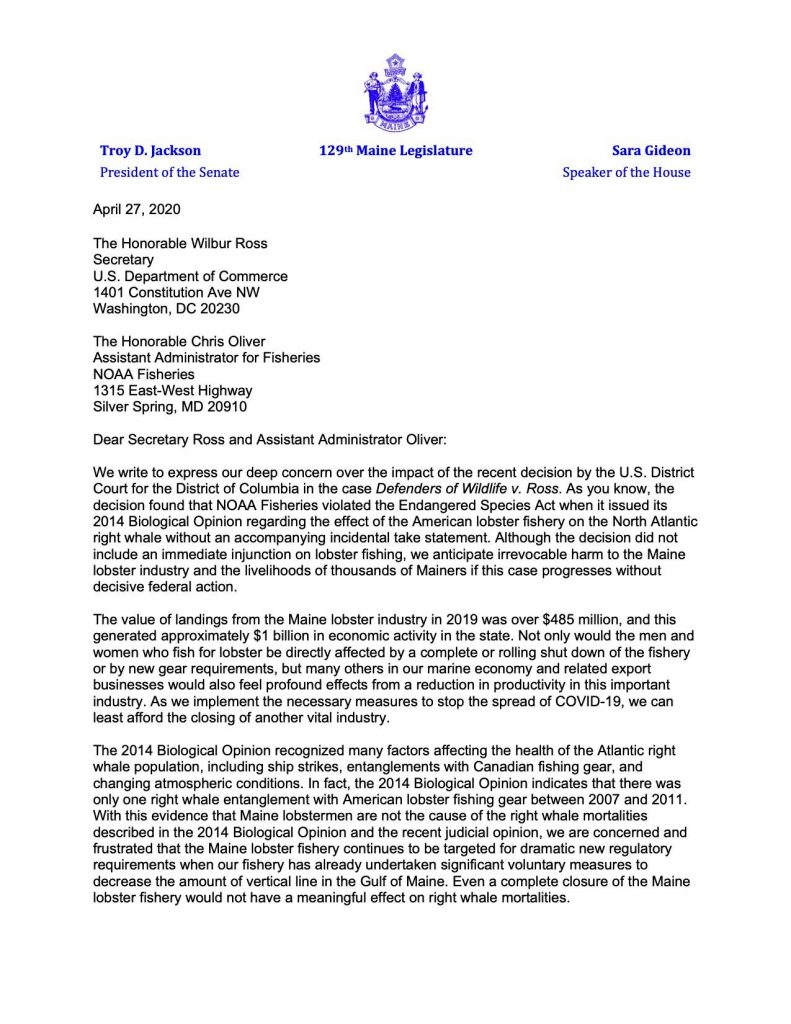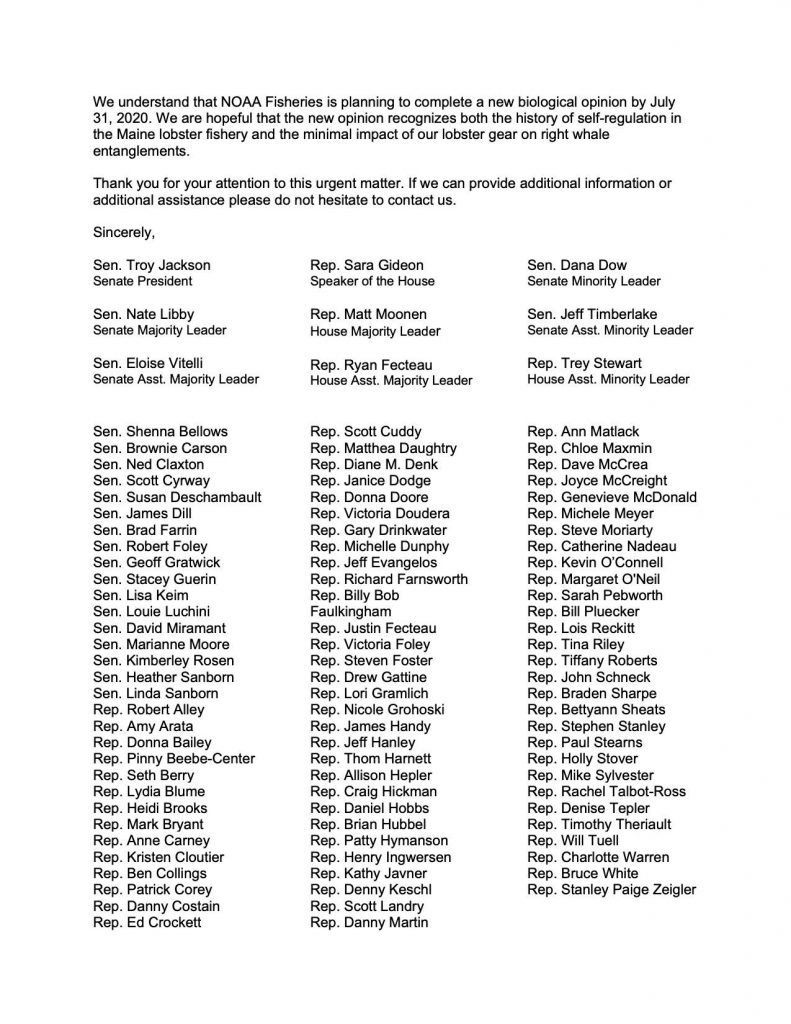Maine Lobster and Right Whales
Maine Lobstermen Working to Protect Right Whales
Maine lobstermen have been practicing sustainability measures for over 150 years. This means protecting the health of the lobster stock, and also treating the entire marine environment with respect and care. The industry recognizes the precarious situation of the North Atlantic right whale, and since the 1990s fishermen have been taking proactive steps to ensure the fishery and the whales can co-exist.
The lobster industry is Maine’s economic engine, sustaining not only the men and women who fish but entire communities. Fishermen are willing to make changes to protect whales and have been active participants in the ongoing discussions. Before regulations are implemented, lobstermen deserve to know that these measures will positively impact right whales and are backed by sound science.
The Maine Lobster industry will continue to be a part of the conversations to ensure the health of the fishery and environment that it operates within.
Ensuring Effective Solutions
Maine is committed to saving right whales, as well as preserving the livelihood of Maine Lobstermen, and the future of Maine’s coastal communities. We need to find a solution that works for everyone.
Regulations that will hurt the fishery but won’t save the whales aren’t the answer. NOAA’s own data show that even if the Maine Lobster industry disappeared overnight, it wouldn’t be enough to stabilize the right whale population without other industries and countries making changes.
Placing the responsibility of a near total reduction in right whale deaths and serious injuries solely on U.S. fisheries that already have safety measures in place will devastate an industry that supports countless coastal communities in Maine, beyond just the fishermen.
While ropeless fishing is often presented as an easy solution, it is not currently a viable technology for economic, operational and enforcement reasons. Converting the Maine Lobster fleet to ropeless technology would be an extreme measure costing the average fisherman $375k to implement, in a fishery that has a low occurrence of right whales and significant safety measures already in place.
A Longstanding Commitment to Right Whale Safety
MAINE LOBSTER + MARINE STEWARDSHIP COUNCIL (MSC) CERTIFICATION
As they have been for over a century, Maine lobstermen remain committed to ensuring the future of the fishery and the future of Maine marine life. To learn more about our response to the recent Maine Lobster + Marine Stewardship Council (MSC) Certification decision and the fishery’s ongoing sustainability efforts, download our fact sheet.
Maine Lobstermen have led the way in making gear
safe for right whales – but others must follow.
safe for right whales – but others must follow.
North Atlantic right whales are a species whose limited population is in danger,
and Maine Lobstermen are fully dedicated to ensuring their continued existence.
POSITIVE IMPACT
53% increase in the right whale population since new rules were implemented in the Maine Lobster fishery in 1990
90% reduction in known U.S. lobster gear entanglements since enhanced gear safety measures were adopted in 2009
DECADES OF IMPLEMENTING EFFECTIVE CHANGES
- Reducing rope
- Setting more traps on each buoy line to reduce vertical lines in the water
- Making gear safer for right whales
- Replacing all floating surface rope and rope between lobster traps in the water with whale-safe sinking line
- Incorporating weak links allowing whales to more easily break free from gear
- Hauling all traps at least once per month to reduce gear in the water when it’s not being fished
- Enhancing traceability
- Marking rope with a unique color for better traceability of all Maine Lobster gear
- Innovating new solutions
- Experimenting with ropes and rigging to find safe solutions to keep both fishermen and whales safe
- Developing new tools that would cut ropes if encountered by a whale but stay intact to haul gear
The Ocean Has No Borders
One fishery in isolation cannot save the right whales. Ultimately, we all must contribute to help save these animals.
| Shared accountability | We need other fisheries and countries to enact effective regulations. In Canada, where right whales now feed and congregate, regulators have not eliminated floating rope and are relying on dynamic closures, where right whales must be detected to implement protections. This is a reactive rather than proactive management approach. |
| Fairness in data | Current evaluations assign 50% of “unknown” deaths and serious injuries to the U.S., a point that simply isn’t backed up by what we know about whale injuries and deaths. |
| One size does not fit all | All areas and fishing gear do not pose the same risk to right whales. Solutions must be scaled to protect right whales where they are in most danger. |
“We want to be part of the solution. We are always open and willing to sit down and go over measures that would work for us and for the right whales.”
– Michael Sargent, Maine Lobsterman
SAVE THE MAINE LOBSTER INDUSTRY
For more than 150 years the Maine Lobster industry has worked tirelessly to preserve the Maine Lobster species and protect the marine environment including the North Atlantic right whale. The recent decision by the Monterey Bay Aquarium’s Seafood Watch program to move Maine Lobster to its “Red list” of seafoods to avoid is not supported by the facts. It is counterproductive to decades of proactive efforts made by the fishery to ensure the protection of right whales, including new regulations that are still in the process of being implemented.
Maine Lobster has always been sustainable, and the baseless decision by the Seafood Watch program greatly impacts an industry that is the backbone of the economy in Maine, supporting entire communities, composed of generations of fishermen who have always prioritized the health of the fishery and the Gulf of Maine.
A Longstanding Commitment to Right Whale Safety

In the News
OUR VIEW: LOBSTER INDUSTRY NEEDS MORE TIME TO MEET NEW REGULATIONS
via Portland Press Herald
-
Traps, Ropes, Whales and Gavels: A Chronology of the Battle Over the US Gulf of Maine Lobster Fishery
via Undercurrent News
-
‘I think we owe the state of Maine the benefit of the doubt here,’ says US retailer HEB as it considers future lobster sourcing strategy
via Intrafish
-
Whale entanglements drop, but remain major threat, feds say
via AP News
-
Maine lobstermen fear disaster as new gear regulations take effect
via Portland Press Herald
-
Maine Lobstermen’s Association: Maine lobstermen are committed to protecting our ocean
via Portland Press Herald
-
Pandemic does a number on Maine’s lobster industry
via Bloomberg News
-
A guide to understanding the fight over whales and lobster gear in the Gulf of Maine
via Bangor Daily News
-
OUR VIEW: MAINE LOBSTER RULES SHOULD BE BASED ON REAL-WORLD DATA
via Portland Press Herald
-
Maine Lobstermen’s Association Files Lawsuit Challenging Flawed Federal Plan to Protect Right Whales
via Maine Lobstermen’s Association
-
Whales & Lobsters: Federal Protections for Right Whales Present Challenges for Maine’s Lobster Fishermen
via Maine Public
-
Maine’s congressional delegation urges NMFS to scrap right whale rule changes
via Seafood Source
-
Collision course
via The Ellsworth American
-
Our View: Lobster industry changes require more evidence on whale deaths
via Portland Press Herald
-
Lobstermen launch campaign to save Maine industry; new threats on the horizon
via National Fisherman
-
Regulators fell short on protecting right whales from lobster industry, judge rules
via Portland Press Herald
-
Judge rules lobster fishing impact on right whales needs study
via Maine Biz
-
Maine lobstermen vow to fight for fishery in wake of whale ruling
via WGME
-
Maine lobstermen spray-paint trap lines for whale entanglement study
via Penobscot Bay Pilot
-
Maine finalizes right whale protection plan for lobster industry
via Portland Press Herald
-
Maine Officials Submit New Lobster Fishing Gear Proposal To Feds
via Maine Public
-
Second Maine lobstering group rejects state’s plan for protecting whales
via Portland Press Herald
-
Better marking for lobster gear can help answer important whale question
via Bangor Daily News
-
Frustration With Proposed Lobster Gear Regulations Boils Over: ‘Someone’s Going To Get Killed’
via Maine Public
-
‘It Sucks … But I’m Going To Try It’ — Officials Present Proposed New Gear Rules To Maine Lobstermen
via Maine Public
-
Why Whales Are Worrying Lobstermen in Maine
via Wall Street Journal
-
Maine lobster trade association withdraws from whale protection agreement, citing flawed data
via The Center Square
-
Maine Lobstermen’s Association Withdraws Initial Support On Controversial Gear Rules
via Maine Public
-
Lobstermen: More data needed to determine if Maine gear is entangling right whales
via Maine Biz
-
Angus King says the Maine lobster fleet is not a threat to right whales
via Bangor Daily News
-
Maine lobstermen insist they are not the ones killing right whales
via Portland Press Herald
-
The regulation of the Maine lobster fishery to protect the endangered North Atlantic right whale (Page 6)
via The Lobster Newsletter
-
Maine Voices: Mills’ stand on fishing rules praised by lobster industry
via Portland Press Herald
-
Guest column: Protecting Maine lobstermen and right whales
via The Times Record
-
Claws out: Rally shows public support for Maine’s lobster industry
via National Fisherman
-
Maine political leaders promise to press Trump for state’s lobster haulers opposed to new rules
via Bangor Daily News
-
Rep. McDonald: Federal rules would hurt lobstering, but do little for whales
via Portland Press Herald
-
Our View: Lobster gear changes not yet warranted
via Portland Press Herald
-
Mills, LePage find agreement on helping lobstermen fight feds
via News Center Maine
-
Right whale rules must reflect actual risk
via Bangor Daily News
-
LePage appeals to Trump on lobster regulations
via Portland Press Herald
-
Finding the right way to protect right whales
via Bangor Daily News
-
‘Hail Mary’ tweet, letter to POTUS: Golden fights for Maine lobster industry against regulations
via News Center Maine
-
New rules are meant to save whales; lobstermen wonder if they’ll survive
via Portland Press Herald
-
For lobster industry, a boatload of stresses
via Portland Press Herald
-
State floats whale protection plan that would affect a fraction of state’s lobster fleet
via Press Herald
-
Maine Officials Propose New Rules To Protect Right Whales, Minimize Risks To Lobster Industry
via Maine Public
-
New England Stakeholders Agree On Recommendations For Reducing Risk Of Right Whale Entanglements
via Maine Public
-
Regulators Unveil Risk-Assessment Tool Designed To Help Reduce Right Whale Entanglements
via Maine Public
Maine Voices
Read the Maine Legislature’s letter to
Wilbur Ross, Secretary of the U.S. Department of Commerce
and Chris Oliver, Assistant Administrator of NOAA Fisheries.
-
Read the Message from DMR Commissioner Keliher About Recent Right Whale Mortality
via State of Maine Department of Marine Resources, February 14, 2024
-
Read the Message from DMR Commissioner Keliher About Recent Court Decision
via State of Maine Department of Marine Resources, April 10, 2020
-
Read Commissioner Patrick Keliher’s Guest Column: DMR Whale Plan Reflects Practicality, Federal Reality
via Landings, December 6, 2019
-
Read the DMR’s Right Whale Proposal to NMFS
via State of Maine Department of Marine Resources, January 3, 2020
-
Read the DMR’s Letter to the Maine Lobster Industry Regarding the Whale Plan
via State of Maine Department of Marine Resources, October 16, 2019
-
Read the DMR’s Letter to NMFS Regarding the Scoping Hearings
via State of Maine Department of Marine Resources, September 19, 2019
-
Read the MLA’s Comments on the Scoping Process
via Maine Lobstermen’s Association, September 16, 2019
-
Watch Senator King Advocate for Maine Lobstermen at NOAA Meeting in Ellsworth
via Senator King, August 15, 2019
-
Read the Statement from Govenor Janet T. Mills
via the Office of the Governor Janet T. Mills, July 11, 2019
-
Read the Letter from Maine’s Congressional Delegation
via Congressman Golden’s Office, July 10, 2019
-
Read the MLA’s Letter to NMFS regarding TRT Process Concerns
via Maine Lobstermen’s Association, April 22, 2019
-
Read the DMR’s Letter to NMFS regarding TRT Process Concerns
via Maine Department of Marine Resources, April 19, 2019
-
Read the DMR’s Letter to NOAA regarding Technical Memorandum NMFS-NE-247
via Maine Department of Marine Resources, October 3, 2018
MLA’s Patrice McCarron speaks on whales suit
The Maine Lobstermen’s Association is the only industry group representing Maine fishermen in the lawsuit filed by conservation groups accusing the government of not doing enough to protect right whales. Here, the MLA’s Patrice McCarron speaks with the Maine Coast Fishermen’s Association and breaks down the legal case, the potential impact on the fishery and what’s next.
A few key takeaways:
- Maine lobstermen have always gone above and beyond state and federal regulations to protect our endangered species.
Since the first precautions were enacted in 1995, the industry has responded to the increased measures including comprehensive rules set forth in the 2008 revision to the Whales Plan, removing miles of rope from vertical lines from buoys to lobster traps as well as between traps. Maine fishermen have also implemented regulations in the exempt waters closer to shore that were not required by federal regulators. - Two lawsuits were initially filed by conservation groups in 2018, although the two were later combined.
MLA officially intervened that summer, looking to have a voice in the case and any subsequent measures taken if the ruling went against the government. - The latest court hearing found the NOAA was in violation of the Endangered Species Act.
The ESA is one of two pieces of legislation (the other being the Marine Mammal Protection Act) that shapes how the government protects whales, and of the two, has the lower burden of proof for the plaintiffs to meet. The ruling is based on technicalities in the National Marine Fishery Service’s biological opinion between permitted fishing activity and the potential impact on right whales and essentially says the government is not doing enough to protect the animals. - As we look to what’s next, the industry must stand together during the uncertainty facing our livelihoods.
The next step is that both sides in the court cases will file briefs looking to inform any final decision by the court on regulations. Meanwhile, the NMFS is working to update its biological opinion on right whales, and industries will share proposed remedies to keep lobster boats on the water. This is a moment for lobsterman to educate the courts on the topic, as well as the importance of Maine lobster on the local economy.
Fishermen’s Perspective
-
MAINE LOBSTERMEN ARE NOT A THREAT TO RIGHT WHALES
via Bangor Daily News
-
THE MLA URGES DEPARTMENT OF MARINE RESOURCES TO SIMPLIFY PROPOSED GEAR MARKING
via Landings
-
THE MLA CONTINUES TO CHALLENGE NMFS WHALE PROPOSAL
via Landings
-
ADAPTATION PART OF LIFE FOR MAINE’S LOBSTERMEN
via Landings
This page is brought to you by the Maine Lobster Industry, a collaboration between:
Maine’s Department of Marine Resources, the Maine Lobstermen’s Association,
the Maine Lobster Dealers’ Association, and the Maine Lobster Marketing Collaborative




